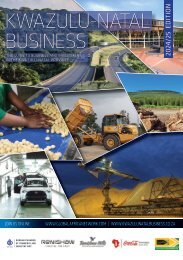Eastern Cape Business 2017 edition
The 2017 edition of Eastern Cape Business is the 10th issue of this highly successful publication that, since its launch in 2006, has established itself as the premier business and investment guide to the Eastern Cape Province. The Eastern Cape enjoys an abundance of natural and human resources, as well as established industrial infrastructure that drives the economy of the province. This includes three ports and two industrial development zones which are home to a wide range of manufacturers and exporters. The 2017 edition includes an in-depth look at the province’s two Industrial Development Zones, a focus on skills development and investment climate information from the Nelson Mandela Business Chamber and the Border-Kei Chamber of Business.
The 2017 edition of Eastern Cape Business is the 10th issue of this highly successful publication that, since its launch in 2006, has established itself as the premier business and investment guide to the Eastern Cape Province. The Eastern Cape enjoys an abundance of natural and human resources, as well as established industrial infrastructure that drives the economy of the province. This includes three ports and two industrial development zones which are home to a wide range of manufacturers and exporters.
The 2017 edition includes an in-depth look at the province’s two Industrial Development Zones, a focus on skills development and investment climate information from the Nelson Mandela Business Chamber and the Border-Kei Chamber of Business.
You also want an ePaper? Increase the reach of your titles
YUMPU automatically turns print PDFs into web optimized ePapers that Google loves.
Managing the region’s<br />
water resources<br />
How badly has the <strong>Eastern</strong> <strong>Cape</strong> been affected by drought and what is Amatola<br />
Water doing to mitigate these effects?<br />
Although the water sector has had a difficult time due to the prolonged drought, fortunately<br />
Amatola Water’s area of supply has been blessed with sufficient rain and dam levels remained<br />
full at between 95-100%. The water crisis has affected some areas in the <strong>Eastern</strong> <strong>Cape</strong> and those<br />
municipalities are being guided by the Drought Disaster Plan in order to cope with the conditions.<br />
Lefadi Makibinyane<br />
Lefadi Makibinyane is the Chief Executive<br />
Officer of Amatola Water. He joined Amatola<br />
Water in February 2015 from the Consulting<br />
Engineers South Africa (CESA), where he also<br />
served as CEO.<br />
Makibinyane is an accomplished engineer<br />
and executive, having worked in various leadership<br />
positions in both public and corporate<br />
institutions, including the City of Tshwane<br />
Metropolitan Municipality, Fieldstone Africa,<br />
the Industrial Development Corporation of<br />
South Africa (IDC), South African Breweries<br />
(SAB) and SASOL, among others.<br />
He holds an Honours Degree in Chemical<br />
Engineering from the University of Teesside,<br />
Middlesbrough, in the United Kingdom, a Post-<br />
Graduate Certificate in Project Management<br />
as well as Masters in <strong>Business</strong> Leadership from<br />
the University of South Africa’s School of <strong>Business</strong><br />
Leadership, in Pretoria. He also serves<br />
as a non-executive director on the Boards of<br />
Rand Water, the Construction Industry Development<br />
Board (CIDB), the Gauteng Partnership<br />
Fund and also as a member of the<br />
Presidential BBBEE Advisory Council.<br />
Please describe the main highlights that Amatola Water achieved in the past<br />
financial year.<br />
We were very proud to be appointed as implementing agent for the Nooitgedacht/Coega lowlevel<br />
project in the Nelson Mandela Bay Metropolitan Municipality as well as the Amathole dry<br />
sanitation project. Ongoing projects where we effectively implemented strategic water and<br />
sanitation schemes include the King Sabata Dalindyebo Presidential Intervention (water and<br />
waste-water infrastructure upgrade), the Makana Right of Use (RoU) project, the Ndlambe<br />
Regional Bulk Water Supply, the Nahoon-East Coast Bulk Supply Pipeline and the upgrades of<br />
Amatola Water plants. In addition, we achieved:<br />
• 98% compliance to SANS Class 1 potable water standards<br />
• 100% assurance of supply to our customers<br />
• 11.98% against a target of 12% with regard to production and network losses.<br />
This minimised environmental, financial and social impacts of losses and unaccounted<br />
for water.<br />
In recording an 18% increase in revenue, we were also pleased to say that we supported<br />
qualifying small enterprises, emerging micro-enterprises and black-owned businesses. A clean<br />
audit was achieved.<br />
What are some of the key challenges facing the utility’s successful operation in<br />
the next few years?<br />
Being geographically limited in terms of the Government Gazette of 1997 means it is difficult to<br />
grow the business. However, when water crises happen we step in as per ministerial directives<br />
as an implementing agent to develop infrastructure or to operate or maintain water treatment<br />
works. This pushes up our operational costs, which are well above the national norm.<br />
We support the long-term strategy of the Department of Water and Sanitation, namely the<br />
Institutional Reform and Realignment (IRR) which includes the transfer of strategic and specific<br />
assets to regional water boards such as Amatola Water.<br />
Could you expand on the competition issues between water utilities and municipalities<br />
as bulk water suppliers?<br />
The competition that exists poses a long-term challenge to the implementation of the IRR<br />
strategy, which seeks to establish regional water utilities to improve the scale and effectiveness<br />
of water service delivery. As the only water board in the <strong>Eastern</strong> <strong>Cape</strong>, Amatola Water could best<br />
serve by providing a bulk water service to the entire province. Municipalities would then be<br />
able to focus on the water reticulation network and, in so doing, improve the quality of service<br />
delivery to residential, industrial and commercial users.


















